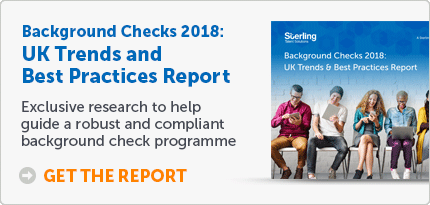April 16th, 2018 | Sterling
New Survey Finds Growth in UK Organisations Performing Global Background Checks
Sterling surveyed over 300 UK-based employers in 33 industries about their use of background checks to gain key insights into emerging trends, technology and more for our Background Checks 2018: UK Trends & Best Practices Report. We surveyed businesses large (over 10,000 employees) and small (up to 49 employees) with the largest group of respondents representing companies with 100-299 employees. The greatest number of responses came from the following industries: Consulting/Professional Services, Education, Healthcare, Financial Services/Securities, Technology, Non-Profit/Charity, Information/Data Services, Government and Manufacturing.
Who is Performing Background Checks?
The survey found that 78% of employers conduct background checks. Compared to our 2016 data, which found that six out of 10 organisations conducted checks, this is a welcome increase and indicates that more employers understand the importance of a robust background screening programme. At a time when we are seeing increased globalisation, uncertainty over Brexit and a more complex legal landscape, this is not surprising. From hiring the best candidates to meeting regulatory compliance, it’s important to understand how screening would be beneficial to your organisation.
Why Do Organisations Conduct Background Checks?
An employment background check provides a detailed look at a new hire, giving businesses the insight they need to make an informed hiring decision. We asked survey responders why they conduct background screening.
With GDPR updates going into effect on 25 May 2018 and the transition to Brexit starting next year, there is and will be many changes in the hiring compliance landscape in the next year. Ensuring your organisation remains compliant throughout the screening process is crucial. Keep a record of every part of the recruitment process, in accordance with data protection regulations, and make sure screening remains transparent and fair throughout so as to minimise any legal risks.
Global Screening Disparities
There are many takeaways from the trends report that we will be spotlighting in the next few months. One of the key topics of the report is the importance of global screening. Hiring foreign-born or international workers can be a great benefit to employers looking to diversify their workforces or fill any skills gaps, yet it can present significant screening challenges. Data protection and privacy laws vary between countries, making global screening an important, but complex process for many organisations. Issues such as compliance with foreign data protection laws, the type of information that needs to be searched and how to interpret the results are key considerations for employers.
According to our survey, 79% of businesses employ foreign-born workers (compared to 88% in 2016), yet 40% don’t currently conduct or plan to conduct any global screening in the next year. This may be due to the complexities associated with screening globally. When asked what type of global screening they currently conduct, 39% of respondents said they screen for criminal records, 39% screen for Right to Work, 38% screen for employment verification and 29% screen for identity verification.
What is a Global Background Check?
A global background check is a collection of screening elements that could include a criminal record check, address, employment and education verifications, identity verifications or even reference checks. Global background checks will vary based on many factors including the type of position being filled, past countries of residence, country and region-specific privacy and data protection regulations and the level of risk the position poses to an organisation.
Today, over 55% of the current UK workforce was born outside the UK. Hiring foreign-born workers or workers who have lived and worked abroad can present screening challenges. European Union (EU) nationals can currently look for work at a job in another EU country without a work permit and even stay in that country after the work is finished. Compliance with foreign privacy laws, the type of information available, budget, turn-around-time and how to interpret results are key considerations for most recruiters. Brexit will obviously change this, but how has yet to be seen.
Partnering with a Third-Party Background Check Provider
The survey found that over half of respondents plan to use an external third-party provider to perform checks in the next year. Businesses are more likely to use in-house resources to screen for Right to Work, reference interviews and education credentials, while they are inclined to use a paid third party for criminal records, credit/financial history and public safety verification, which is consistent with our 2016 data.
It’s important to identify which checks are relevant to your organisation and if you would be better off outsourcing to a third party. Outsourcing can save valuable time and money, enhance efficiency and help to ensure you stay compliant with a global workforce. Yet, whether you choose to screen in-house or use a third party, a documented screening policy is recommended.
Any business with operations in another country or that hires employees with international experience needs to have a thorough global background screening process in place to minimize risk and make the best hiring decisions. When determining the applicable law for screening, it is important to understand the territorial (jurisdiction and location) and the material (country and sector) scope of the laws. A company’s background screening programme must align with local legal requirements and restrictions. Data privacy, employment and discrimination laws all factor into the background screening process.
Find out more survey results and information on background screening trends by downloading a copy of our report, “Background Checks 2018: UK Trends & Best Practices Report”.
This publication is for informational purposes only and nothing contained in it should be construed as legal advice. We expressly disclaim any warranty or responsibility for damages arising out this information. We encourage you to consult with legal counsel regarding your specific needs. We do not undertake any duty to update previously posted materials.

